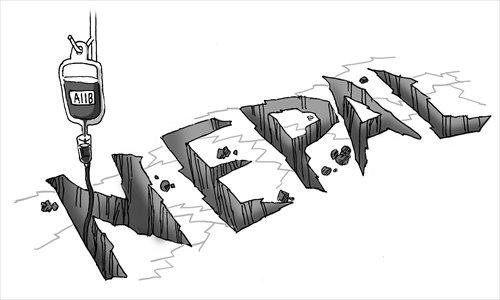原标题:AIIB can play useful role in reconstruction of earthquake-hit Nepal

Illustration: Liu Rui/GT
A massive earthquake of 8.1 magnitude at a depth of 20 kilometers struck Nepal on April 25, followed by over 100 aftershocks, centered in the city of Pokhara. As of Sunday, the death toll caused by the earthquake has climbed to 8,019, and 17,866 people have been injured.
Pokhara is the second largest city of Nepal as well as a famous tourist resort. This earthquake has brought the country catastrophic damage, with its total economic loss possibly exceeding $5 billion.
According to the Travel and Tourism Economic Impact 2013 report, the contribution of travel and tourism to Nepal's GDP was $1.6 billion, 8.2 percent of its total GDP. But this time, the country's rich cultural heritage suffered a devastating blow from the strong shock, with 14 ancient buildings damaged, most of which fully collapsed. At least five to 10 years are needed for reconstruction. Tourism, one of the country's most important industries,was badly hit and will take quite a long time to recover.
The UN statistics show that the quake affected 8 million people in Nepal and at least 2 million will face a difficult time in the coming three months without shelter, water, food and medication. Even worse, the monsoon will arrive by the end of this month, so temporary housing is desperately needed for the moment.
So far, the Asian Development Bank has promised to provide a $300 million loan to Nepal. A number of countries have also made promises to donate money.
Before the earthquake, the bilateral economic and trade cooperation has been frequent between China and Nepal. The later has been actively promoting the establishment of domestic special economic zones, and Chinese non-financial outbound direct investment in Nepal reached $46.09 million in 2013.
There are around 90 Chinese companies investing in Nepal at the moment. And with the political climate of Nepal becoming increasingly stable, and the China-led "One Belt and One Road" initiative progressing steadily, Chinese business in Nepal will scale up gradually in the future, with broader prospects to participate in the country's development in the fields of road, railway, communication, aviation and irrigation.
After the earthquake, the Chinese rescue team rapidly carried out disaster relief. Material and human assistance were soon dispatched to the quake-hit area, which won China a high reputation.
As an important neighbor of China, Nepal is one of 57 economies that applied to be founding members of the Beijing-initiated Asian Infrastructure Investment Bank (AIIB). Kathmandu has expressed its strong support for the AIIB and the "One Belt and One Road" initiative before. Since the purpose of establishing the AIIB is to provide funding for infrastructure construction in Asia. There might be some discussions with other funding members over the terms of the AIIB, but offering aid to Nepal will definitely be a done deal.
Nepal is an important nation along the extension line of Qinghai-Tibet railway, as well as a significant country in the "One Belt and One Road" project. Participating in the reconstruction work of Nepal is not only a vital part of fulfilling the responsibilities of a major country, but also a breakthrough in promoting the "One Belt and One Road."
The AIIB has not yet begun the formal operation, so it will take some time before it can actually begin helping with the rehabilitation of Nepal. The AIIB could set an example in this process, by building up a conciliation group to cope with disasters in Asian nations.
As a founding member of the AIIB, China should take the initiative to help with the infrastructure construction in the Asian developing countries, while also coordinating the interests of all parties. Only in this way can we lay a solid foundation for establishing a "community of common destiny."
The author is a research fellow with the Charhar Institute and a research fellow with the Maritime Silk Road Institute, Huaqiao University.
原文链接:http://www.globaltimes.cn/content/921133.shtml